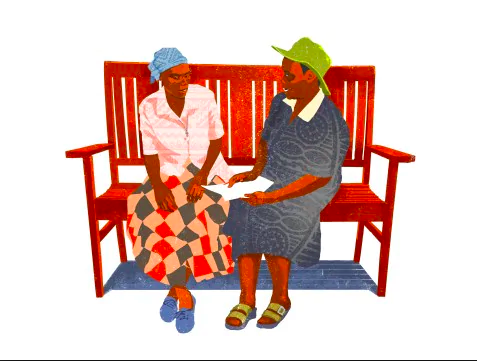
The Grannie Bench
by Laura Claverie, September 2018
Helping depression with Zimbabwe’s grandmothers
I recently viewed a fascinating TED Talk by Dr. Dixon Chibanda, a psychiatrist in Zimbabwe. TED talks feature the best and brightest in many professional fields. Many, of course, are life-changing pursuits.
According to Dr. Chibanda, there are only 12 certified psychiatrists in his country, which consists of 14 million people. The country was in crisis with too many Zimbabweans suffering from “Kufungisisa” or thinking too much. It’s better known in America as depression.
At a gathering of psychiatrists, it was decided that the only way that the physicians, with their limited resources, could lift the country out of its epidemic depression was to use an existing resource in the country and train them to work with depressed individuals. After much research, they found the best resource in the country was its grandmothers.
Hundreds of grandmothers were trained and spanned the countryside. Some found their “patients” simply by sitting on park benches and talking with strangers who looked to be suffering from kufungisisa. Over a period of years, more than 30,000 depressed individuals were treated from these Grannie Benches.
The results from this Grandmother Therapy program were impressive: depression country-wide decreased. In clinical trials, grandmothers were more effective in treating depression than medical doctors. The program was so successful that the Journal of the American Medical Association featured the Zimbabwe Grandmother program in its prestigious publication.
Imagine our country if we duplicated this effort in every city and state. We could deploy a bunch of local, trained grandmothers to sit on benches in City Park, Audubon Park and in playgrounds across the city to listen to the younger generations and to just care. Sometimes, all a kid needs is to know someone cares.
In my own family, I do my best to just listen when my grandchildren complain about things. Often, their complaints and concerns are pretty simple to understand and deal with.
The other day, Rylan, 11, had a tummy ache and had to stay home from school. I got to keep him at my house and even brought him to a meeting, where I placed him at a reading table outside the meeting room.
After the meeting, I offered to take Ry for a treat—anything he wanted. He hemmed and hawed and couldn’t make a decision. I told him to take his time and he’d figure it out. We waited as he weighed his options, and he still remained undecided. I patiently waited. We got in my car and began driving down the street, and he still was undecided and began berating himself for his indecision.
I calmly said, “No problem, dude. You’ll figure it out. I have all day to wait.”
He then answered, “See, Lollie, the real problem why I’m having trouble making decisions is that I’m puberty-ish. Kids get that way when they are puberty-ish.”
In an earlier generation, I might not have been as patient. And I might have giggled at his explanation. But I’m older, wiser, and I hope I’ve learned a thing or two. So I assured him that being “puberty-ish” was quite normal, and it is. I also told him that at one time, I was puberty-ish. I omitted the years I was menopausal-ish and old-fart-ish. Those are for another conversation.
In the end, I stayed on my own Grannie Bench and just listened. Before long, Rylan announced that he wanted to get yogurt, so we did.
A little Grannie Therapy and some chocolate yogurt can go a long way to mend a sour tummy and touch of kufungisisa. Maybe our city should start some grannie training and buy some benches. We grandmothers have a lot of work to do!
Laura Claverie is a freelance writer and grandmother to two wonderful grandchildren, Rylan and Amelia. She lives in the Garden District. Check out Laura’s article ‘The New Grandma‘.

